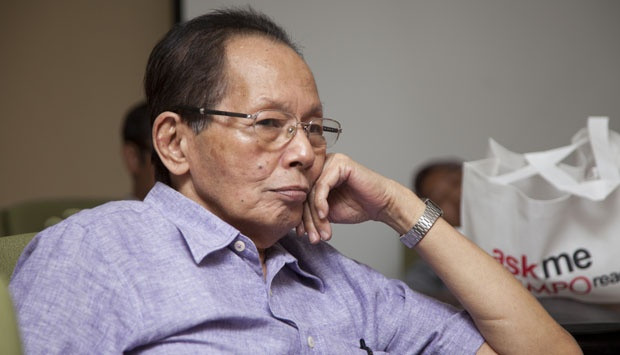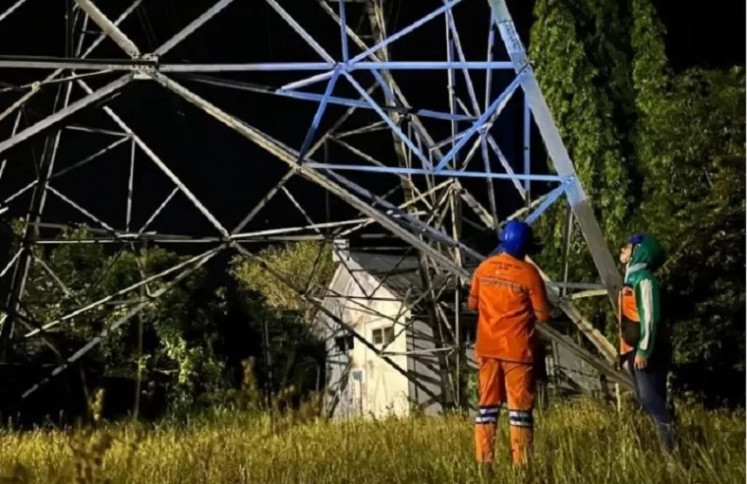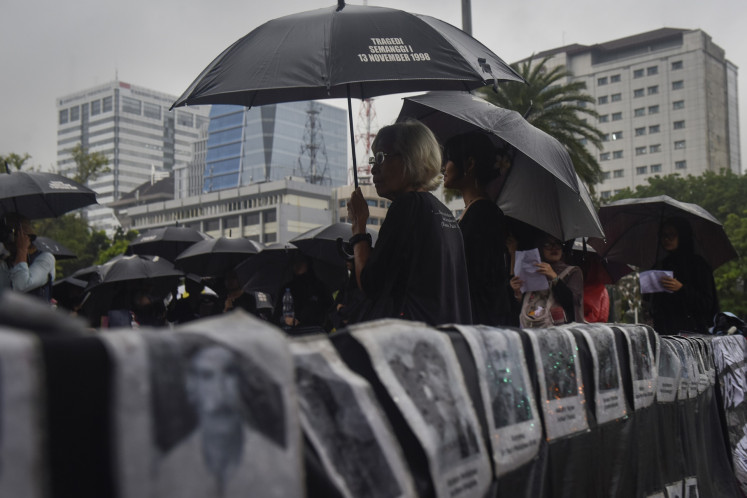Popular Reads
Top Results
Can't find what you're looking for?
View all search resultsPopular Reads
Top Results
Can't find what you're looking for?
View all search resultsRahman Tolleng, a dear friend, has left us
Change text size
Gift Premium Articles
to Anyone
R
ahman Tolleng, a close friend and comrade in the struggle for democracy and humanitarian action, is no longer with us. He passed away on Jan. 29 at the age of 81 (he was born in 1937 like me), after falling ill a few years ago.
Tolleng and I were together up front in 1965 in the struggle for regime change amid the authoritarian rule of Sukarno. He was a thinker, journalist and activist, while I was organizing the student movement and the political parties. We together supported the fight against the Indonesian Communist Party and later on played our parts in the 1965 regime change.
He published the weekly Mahasiswa Indonesia (Indonesian Student) in Bandung, West Java, with the objective to update the students in Bandung with the political developments in Jakarta and in return provided those in Jakarta with insight into their ideas and actions.
Those insights and ideas were important, because West Java was considered the ‘’rural” background of Jakarta, and their support was needed to make reforms acceptable by the Indonesian people at large.
The Rahman Tolleng group, which included, among other figures, Sarwono Kusumaatmadja, was active in giving political statements and conducting political rallies in Bandung. Their ideas and actions were considered influential to the military commanders in Java, as they put pressure on the Soeharto government and the Military Command to accelerate the reform process.
Pushed by such pressure, Soeharto and the armed forces headquarters gradually took over the reform process, and the special role of the Java military commanders, especially HR “Ton” Darsono (Siliwangi West Java military command), Kemal Idris (Army’s Strategic Reserve Command or Kostrad) and Sarwo Edhie (RPKAD, now Kopassus or Army Special Forces) ended in 1968.
The reform was accelerated through the work of a coordinating secretariat (SEKBER) of Golongan Karya (Golkar), which later became a fully fledged political party. Tolleng and I joined forces again in Golkar as we were active from the beginning. We were involved in organizing the first general election of 1971, and later in the party’s consolidation after the first congress was held in Surabaya in 1973.
In preparation for the general election, we collaborated to establish theSuara Karya daily. On March 8, 1967, Ali Moertopo, then the political assistant to president Soeharto, lent his support to me to start the newspaper that would be the voice of Golkar in the general election.
It was due to be published on March 1 to commemorate the Supersemar (Sukarno’s mandate dated March 11, 1966, to Soeharto to restore peace and order in Indonesia). We did it, with Sumiskun, later a vice speaker of the House of Representatives and an advisor to the political team of Soeharto, acting as the publisher, while Tolleng was the first chief editor.
Although it was a good newspaper, as applauded by Goenawan Mohamad, the editor of Tempo magazine, after a few years of its existence, Suara Karyanever stood a chance to develop affinity among the general public, mainly because of the connection to Golkar. It was mainly distributed to and read by Golkar people, including the government officials who were pillars of the party.
In January 1974, Tolleng and I separated because of the differences in our stance in the Malari incident, in relations to the students’ anti-Japanese movement. At the time the issue was caused by the perception of Japan’s over presence in Indonesia’s economy and their inability to deal with the resentment of the Indonesian people.
At the same time, the issue was also a result of the competition among the military personnel around Soeharto, for influence. Since then, it must be noted that there has been significant changes in Japanese economic and business policies as a response to the Malari incident.
After the incident, when Tolleng and I asked each other what really was the issue that divided us, neither of us could answer it adequately. Indeed, we promised each other that at a later stage we should try to find the answer to our differences. Unfortunately, we never did. We never really found out the bottom line of our differences, but my hunch is that rumors and psychological war played by the intelligence services on both sides created a huge gap among us, including Tolleng and I, and pre-existing prejudices made it only worse.
Amid all the issues, Tolleng and I had maintained good relations, although we did not always find the time to talk to each other very often. And I did fulfill my promise, made before Malari, to support him with a car from Suara Karya daily. From time to time we would get together in meetings and conferences organized by, among others, the Centre for Strategic and International Studies (CSIS).
Tolleng had a full life despite all kinds of struggle and constrains. He was a real socialist at heart and a democrat in his political struggle. Despite our differences, we were able to put our ideas to practice, particularly our common ideas for democracy and humanities.
I greatly appreciate him as a partner and can only hope that the respect had been mutual. Although I was not close to his family, I wish them all the best in the future and hope to maintain relations with them.
May God bless him and his family.
***
The writer is the vice chair of CSIS Foundation’s Board of Trustees, Jakarta











